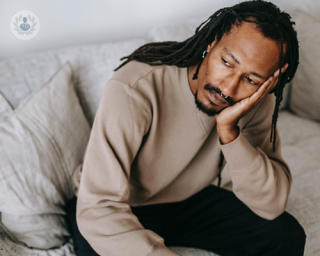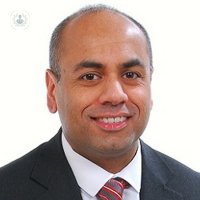What is testosterone replacement therapy?
Testosterone replacement therapy, also called TRT, is prescribed to men who produce low levels of the hormone and suffer from symptoms as a result. It is one of many hormone treatments, that involves replenishing the levels with exogenous (artificial) testosterone.
Testosterone is the main sex and anabolic (muscle building) hormone, produced by men from the testes. It plays a vital role in many biological processes, affecting health and longevity.
A decline in testosterone production is common as men age, at a rate of about 2% per year over the age of 30. Low testosterone levels do not always require treatment. Therefore, TRT isn’t recommended to men who have low levels but are without symptoms.

Why is testosterone replacement therapy used?
Although a reduction in testosterone is a natural part of aging, it can also have a negative impact on wellbeing. TRT is prescribed to make up for the fall in testosterone production and to combat its associated symptoms.
These symptoms can affect:
- Sex life: lower sex drive, erectile dysfunction, and infertility.
- Physical well-being: loss of muscular strength, increased body fat (and weight gain which sometimes involves the breasts).
- Emotional well-being: fatigue, difficulty concentrating, increased irritabiity and low mood.
What does testosterone replacement therapy involve?
If you are experiencing these symptoms and suspect the cause to be low testosterone levels, you should see your GP (or if you prefer a hormone specialist). They will assess your case and take bloods if necessary to measure testosterone levels. If the results show signs of deficiency, you will be referred to a hormone specialist, an endocrinologist, who will prescribe TRT to suitable patients.
The hormone can be administered in different ways. Common methods include topical gels or injections. No pill is offered, as oral consumption of testosterone can damage the liver. The aforementioned methods are absorbed directly into the bloodstream with benefits often seen within a few weeks.
Who is testosterone replacement therapy suitable for?
Doctors may advise against treatment if the patient has prostate or breast cancer, or one of the following conditions:
- Sleep apnoea
- Lower urinary tract symptoms (associated with large prostate)
- Congestive heart failure
- Abnormal red blood cell counts
The risks and benefits will be weighed up. If treatment is advised, monitoring of your full blood count, prostate enzyme level and testosterone will be arranged.
Does testosterone replacement therapy carry any risks?
Taking testosterone as a performance enhancing drug is not recommended due the risk of adverse side effects. However, in TRT, safe replacement doses of testosterone are prescribed.
Regular check-ups with your GP whilst on TRT are important. Side effects of the treatment include:
- Oily skin, causing acne
- Pain at injection sites
- Skin irritation from gels
- A rise in blood counts
Prescription doses require adjustment to optimise treatment and minimise side effects.
01-26-2022 01-23-2024Testosterone replacement therapy
Dr Masud Haq - Endocrinology, diabetes & metabolism
Created on: 01-26-2022
Updated on: 01-23-2024
Edited by: Aoife Maguire
What is testosterone replacement therapy?
Testosterone replacement therapy, also called TRT, is prescribed to men who produce low levels of the hormone and suffer from symptoms as a result. It is one of many hormone treatments, that involves replenishing the levels with exogenous (artificial) testosterone.
Testosterone is the main sex and anabolic (muscle building) hormone, produced by men from the testes. It plays a vital role in many biological processes, affecting health and longevity.
A decline in testosterone production is common as men age, at a rate of about 2% per year over the age of 30. Low testosterone levels do not always require treatment. Therefore, TRT isn’t recommended to men who have low levels but are without symptoms.

Why is testosterone replacement therapy used?
Although a reduction in testosterone is a natural part of aging, it can also have a negative impact on wellbeing. TRT is prescribed to make up for the fall in testosterone production and to combat its associated symptoms.
These symptoms can affect:
- Sex life: lower sex drive, erectile dysfunction, and infertility.
- Physical well-being: loss of muscular strength, increased body fat (and weight gain which sometimes involves the breasts).
- Emotional well-being: fatigue, difficulty concentrating, increased irritabiity and low mood.
What does testosterone replacement therapy involve?
If you are experiencing these symptoms and suspect the cause to be low testosterone levels, you should see your GP (or if you prefer a hormone specialist). They will assess your case and take bloods if necessary to measure testosterone levels. If the results show signs of deficiency, you will be referred to a hormone specialist, an endocrinologist, who will prescribe TRT to suitable patients.
The hormone can be administered in different ways. Common methods include topical gels or injections. No pill is offered, as oral consumption of testosterone can damage the liver. The aforementioned methods are absorbed directly into the bloodstream with benefits often seen within a few weeks.
Who is testosterone replacement therapy suitable for?
Doctors may advise against treatment if the patient has prostate or breast cancer, or one of the following conditions:
- Sleep apnoea
- Lower urinary tract symptoms (associated with large prostate)
- Congestive heart failure
- Abnormal red blood cell counts
The risks and benefits will be weighed up. If treatment is advised, monitoring of your full blood count, prostate enzyme level and testosterone will be arranged.
Does testosterone replacement therapy carry any risks?
Taking testosterone as a performance enhancing drug is not recommended due the risk of adverse side effects. However, in TRT, safe replacement doses of testosterone are prescribed.
Regular check-ups with your GP whilst on TRT are important. Side effects of the treatment include:
- Oily skin, causing acne
- Pain at injection sites
- Skin irritation from gels
- A rise in blood counts
Prescription doses require adjustment to optimise treatment and minimise side effects.


What is testosterone deficiency?
By Mr Jas Kalsi
2025-01-27
Testosterone deficiency, often referred to as hypogonadism, occurs when the body produces insufficient amounts of testosterone—a hormone critical for male health. Testosterone is responsible for regulating a range of functions, including muscle mass, bone density, red blood cell production, and libido. Although testosterone is commonly associated with men, women also produce small amounts of this hormone. Testosterone deficiency can result from various causes, including ageing, medical conditions, or lifestyle factors. Leading consultant urologist Mr Jas Kalsi provides a patient-friendly overview of testosterone deficiency, helping you identify potential symptoms and understand its causes and treatment options. See more


Shining a light on male menopause
By Dr Daniel Wright
2025-01-26
Menopause symptoms in men can be just as debilitating as those in women. London-based general practitioner Dr Daniel Wright is here to highlight exactly how it manifests and ways to go about relieving male menopause in this informative and reassuring article. See more


Testosterone deficiency in men: an explanation
By Dr Masud Haq
2025-01-22
Testosterone plays a crucial role in the development and maintenance of male reproductive tissues and is also important for overall health and well-being. Respected consultant endocrinologist Dr Masud Haq explains more about testosterone deficiency, including the symptoms, potential causes and treatment options. See more


When do women need testosterone replacement?
By Mr Gidon Lieberman
2025-01-22
Requiring a mindful approach, testosterone replacement therapy is a complex and effective option for women to treat low testosterone levels and testosterone deficiency. Mr Gidon Lieberman, leading consultant gynaecologist and fertility specialist, provides a comprehensive insight into testosterone replacement for women. See more
Experts in Testosterone replacement therapy
-
Professor Franklin Joseph
Endocrinology, diabetes & metabolismExpert in:
- Menopause
- Perimenopause
- Testosterone replacement therapy
- Diabetes
- Hypothyroidism
- Diseases of the pituitary and hypothalamus
-
Dr Masud Haq
Endocrinology, diabetes & metabolismExpert in:
- Menopause
- Hormone replacement therapy (HRT)
- Testosterone replacement therapy
- Weight loss
- Thyroid
- Diabetes
-
Dr Nina Wilson
GP (general practitioner)Expert in:
- Menopause
- Testosterone for women
- Hormone replacement therapy (HRT)
- Well-woman screening
- Health check up (health screening)
- Testosterone replacement therapy
-
Dr Claire Phipps
Obstetrics & gynaecologyExpert in:
- Hormone replacement therapy (HRT)
- Menopause
- Perimenopause
- Testosterone for women
- Testosterone replacement therapy
- Women's health
- See all

London Gynaecology - The Portland Hospital
London Gynaecology - The Portland Hospital
212 Great Portland Street London W1W 5QN
No existe teléfono en el centro.
By using the telephone number provided by TOP DOCTORS, you automatically agree to let us use your phone number for statistical and commercial purposes. For further information, read our Privacy Policy
Top Doctors

One Woman Health
One Woman Health
Goring Hall Hospital, Bodiam Ave, Goring-by-Sea, Worthing
No existe teléfono en el centro.
By using the telephone number provided by TOP DOCTORS, you automatically agree to let us use your phone number for statistical and commercial purposes. For further information, read our Privacy Policy
Top Doctors

London Gynaecology - Harley Street
London Gynaecology - Harley Street
145 Harley Street London W1G 6BJ
No existe teléfono en el centro.
By using the telephone number provided by TOP DOCTORS, you automatically agree to let us use your phone number for statistical and commercial purposes. For further information, read our Privacy Policy
Top Doctors
-
London Gynaecology - The Portland Hospital
212 Great Portland Street London W1W 5QN, Central LondonExpert in:
- Miscarriage
- Thrush
- Colonoscopy
- Maternity care
- Ultrasound
- Pregnancy
-
One Woman Health
Goring Hall Hospital, Bodiam Ave, Goring-by-Sea, Worthing, WorthingExpert in:
- Women’s health
- Menopause
-
London Gynaecology - Harley Street
145 Harley Street London W1G 6BJ, Central LondonExpert in:
- Miscarriage
- Thrush
- Minimal access surgery (keyhole surgery)
- Colonoscopy
- Ultrasound
- Pregnancy
- See all
- Most viewed diseases, medical tests, and treatments
- Respiratory infection
- Osteoporosis
- Menopause support
- Alzheimer's disease
- Tubal factor infertility
- Cluster headaches
- Tension headache
- Chronic headache
- Complex endometriosis
- Fertility preservation






